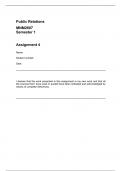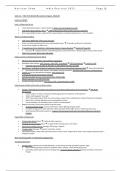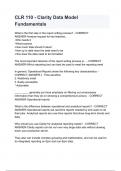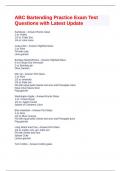Lecture 1
Thomas Midgley Jr is the inventor of a lot of things, for instance chlorofluorocarbon (CFCs) This is dangerous
- Also found leading fuel: this is bad for the environment and human (especially children’s) health
It took more than half a century to get rid of led from fuels -> the toxicity of lead was known already for
2000 years and Midgley and others were aware of this danger and alternatives such as ethanol but they still
chose to put it on the market
- What values guided them? => Profit
o He did not take into accounts that:
Long term environmental problems are making the profit very short
They did not take responsibility for public good (and private good)
- The lesson that we can draw from this:
o Using science/technology/innovation can help solve problems and be valuable in many years, but it
can also cause (new) problems
o Ethics can be facilitator/driver of research for the good
o To do this, theoretical knowledge and practical instruments for hand-on practice might be very
beneficial
The direct and indirect, intended and unintended influences of scientists on moral states
of others is large
- There is a two way directional street between science/technology/innovation and
society
Ethics as a design disciple I: it can be used to minimize certain bad things such as cost and environmental damage
- There are trade offs in certain values when designing something
- Societal needs and problems should be the starting point of science, technology and innovation
- Moral values should be placed at the heart of science, technology and innovation
- Ethics is all about translating values into actions, weighing values against each other and morally justifying
one’s judgements and actions
- Why designs?
o Shape and other values contribute to design (e.g. cars = size, color, status, safety)
o There is rarely 1 unique solution = often different solutions are possible. At the same time you can
distinguish between more/less important values
Thee choices are justified based on ethics
Ethics = practical study of deciding how we ought to act (branch of philosophy)
- It is the branch of philosophy that deals with mortality/values
- It adds systematic reflection on mortality and reason to justify our decisions
o Why this is needed can be due to overcome personal shortcoming or other historical answers
How to recognize morally problematic issues?
- Moral problems arise when values of others are harmed/at stake
- Ethical reasoning is needed whenever we are confronted with a moral problem
o Ethical reasoning (reflection) = looking at values
- An open mind is needed to recognize needs of others and who the relevant others (moral subject) might be
in the problem is important => if someone cannot do this, moral problems arise
Value = what is or is perceived as good and what matters --> can be translated into norms (rules) --> to a design
requirement
- The meaning of value might be different for individuals/per situation --> you need to be able to explain why
a value is crucial
,Moral Spheres = based on our life, there are different moral sphere Hence there are different values that are
more important therefore other norms per context
- Ethics in personal sphere = there are rules for your relations in personal space
o E.g. loyalty as a value with the norm ‘one always helps one’s friends’
- Ethics in business = there are rules for business identity
o E.g. sustainability as a value with the norm ‘one has to reduce waste and minimize energy usage’
- Ethics in professional sphere = e.g. dependent on the job you have there are different values (for example
integrity animals)
- Ethics in public sphere = rules for just a society
o E.g. justice as a value with the norm ‘thou shall not kill’
Morally problematic issues in professional sphere involves crossing the boundaries between 2 or more
spheres
Morally problematic is not the same as morally rejectable
- Morally problematic is something to reflect on, to debate about
- Taking a moral stance means: carefully considering and subsequently deciding whether or not a morally
problematic issue is morally objectionable
Ethical thinking = thinking beyond one’s inclinations and prejudices
- For this two things are needed!
1. Open mind
2. Critical reasoning skill
- Steps for ethical thinking
1. Localizing the problem = personal, professional, business, public sphere
2. Consider everything that Is relevant
Values, rights, interests, desires
Relevant actors
Actions – their nature and their (potential) consequences
Moral principles
3. Ethical thinking = formulate a judgement
Critical reasoning and balancing arguments
Defining problem > applying reason > formulate judgement
Three families of ethical reasoning
Family name Consequentialism Deontology Virtue ethics
Measure of moral Desired states Right actions Vir
quality
Core concept Benefits vs cost Principles Character
examples Happiness Respect for dignity Responsibility
Wellbeing Fairness Charitability
Pleasure Justice Honesty
Fulfillment Equality loyalty
,Lecture 2 – Ethical theories #1: deontology, utilitarianism and theory of justice
Deontology = rules are the building stones of what builds our way of ethical decision making
- Example:
o if you know that a baby is going to be Hitler than you still save the baby because we have the moral
obligation to do so
o If someone has money, then we are obligated to donate this to a cause.
Utilitarianism = The reasoning for making a moral decision does not matter, the only thing that matters is the
outcome
Reasoning is important.
The reasoning has been and is still open to dispute = rationalism/idealism vs empiricism/realism
- According to Plato this gives to access to the truth about the world (objective knowledge)
o You do not search for truth because it might have a mean to another, it is an end itself.
o Plato says: You arrive at the truth by reasoning which will give you access to ideas that are out there
- Aristotle = we arrive at the truth through access to the world around us
Utilitarianism/consequentialism
- Measure of moral quality: desired states
- Core concept is the pair of benefits and costs which always can and have to be weighed against each other
o Benefits can be: happiness, wellbeing, pleasure, fulfillment
- There are different versions of this and the most elaborate version is the principle of greatest benefit for the
greatest number
- Famous proponent = John Stuart Mill
Deontology
- Comes from the Greek and it is the study or the law of what has to be. It is therefore also often called duty
ethics
- According to this, the moral quality of actions is not to be found in consequences (whether it contributes to
benefits or succeed in minimizing cost to whomever), it is in the action itself that you can distinguish its
moral quality. Because it will manifest that certain principles are embedded in the action: these principles
can be recognized as reasonable, universalizable
- Core concepts can be principle, respect for dignity, fairness, justice, equality (high ground values that
according to Kant you would want to take into account for everyone at all times)
- Formula = categorical imperative
Virtual ethics
- People can be more or less virtuous, that it is your character: responsibility, honesty, loyalty
- We all have a conception of what the good life and good society looks like
- Being virtuous is living up to having a good life in which you contribute to the good society
Further traits
- Utilitarianism = also take into account moral subjects beyond humans
o Animals
- Deontology = is more anthropocentric
o It puts humanity at the heart of the theory, and it is in relation to men’s reason that we have to
understand its compulsion to behave in morally correct fashion
o Individualistic
, Utilitarianism
Roots of utilitarianism/consequentialism:
- Hume’s “subjectivism”
o He said that when you say killing is bad, you are not saying something about the act of killing. You
are saying something about your feeling towards it
“it is the object of feeling, not reason” and “nothing is in our mind, what was not before in our
senses”
o Good and evil according to him are just the feeling of + or - and nothing beyond this and your
judgements (this is not a good thing to do) and action on that judgement (hence I will not due it) are
empowered by passion and they follow hardwired facts
o Pain vs pleasure (it is all sensory)
- Jeremy Bentham improved the statement of Hume “utilitarian calculus”
o He said that we can translate it (+/-) into pleasure and pain and sensory data that give us an
indication of what it is that we experience. There is the standard of right and wrong and on the other
hand the chain of causes and effects.
o He said that we can calculate the trade off between consequences of our acts in terms of estimated
increased or diminished pain and pleasure for the society
- John Stuart mill: the most elaborate and “rigid” version of theory
o He says that what matters is that the greatest happiness is achieved for the greatest number and
what does not matter is why one does what one does as long as what you do has as a consequence
that it contributes to happiness at the greatest number
“you can do good things with an awful reason”
o The greatest happiness is not you yourself necessarily
What does the utilitarianist say?
- The only thing that matters is the consequences (outcomes/utility) of the actions: how much use it has for
contributing to happiness and preventing harm & why you do it does not matter why or what you do
The end justifies the mean
Deontology
- You should consider the action it itself and the outcome is less relevant
- Immanuel Kant
o Kant’s 3 questions
What can I know?
What must I do?
What may I hope?
According to this view we as human beings are not just random biological species but we are special species:
we are reasonable (rational). As rational beings we are completely free to always obey the law of nature
(moral law)
o Freedom (autonomy) is still there but it is free to act in accordance to the law (being reasonable)
There are different things presumed in the notion of freedom:
- We are free if what we do is not taking place in threat
o E.g. being threatened to save a child
Thomas Midgley Jr is the inventor of a lot of things, for instance chlorofluorocarbon (CFCs) This is dangerous
- Also found leading fuel: this is bad for the environment and human (especially children’s) health
It took more than half a century to get rid of led from fuels -> the toxicity of lead was known already for
2000 years and Midgley and others were aware of this danger and alternatives such as ethanol but they still
chose to put it on the market
- What values guided them? => Profit
o He did not take into accounts that:
Long term environmental problems are making the profit very short
They did not take responsibility for public good (and private good)
- The lesson that we can draw from this:
o Using science/technology/innovation can help solve problems and be valuable in many years, but it
can also cause (new) problems
o Ethics can be facilitator/driver of research for the good
o To do this, theoretical knowledge and practical instruments for hand-on practice might be very
beneficial
The direct and indirect, intended and unintended influences of scientists on moral states
of others is large
- There is a two way directional street between science/technology/innovation and
society
Ethics as a design disciple I: it can be used to minimize certain bad things such as cost and environmental damage
- There are trade offs in certain values when designing something
- Societal needs and problems should be the starting point of science, technology and innovation
- Moral values should be placed at the heart of science, technology and innovation
- Ethics is all about translating values into actions, weighing values against each other and morally justifying
one’s judgements and actions
- Why designs?
o Shape and other values contribute to design (e.g. cars = size, color, status, safety)
o There is rarely 1 unique solution = often different solutions are possible. At the same time you can
distinguish between more/less important values
Thee choices are justified based on ethics
Ethics = practical study of deciding how we ought to act (branch of philosophy)
- It is the branch of philosophy that deals with mortality/values
- It adds systematic reflection on mortality and reason to justify our decisions
o Why this is needed can be due to overcome personal shortcoming or other historical answers
How to recognize morally problematic issues?
- Moral problems arise when values of others are harmed/at stake
- Ethical reasoning is needed whenever we are confronted with a moral problem
o Ethical reasoning (reflection) = looking at values
- An open mind is needed to recognize needs of others and who the relevant others (moral subject) might be
in the problem is important => if someone cannot do this, moral problems arise
Value = what is or is perceived as good and what matters --> can be translated into norms (rules) --> to a design
requirement
- The meaning of value might be different for individuals/per situation --> you need to be able to explain why
a value is crucial
,Moral Spheres = based on our life, there are different moral sphere Hence there are different values that are
more important therefore other norms per context
- Ethics in personal sphere = there are rules for your relations in personal space
o E.g. loyalty as a value with the norm ‘one always helps one’s friends’
- Ethics in business = there are rules for business identity
o E.g. sustainability as a value with the norm ‘one has to reduce waste and minimize energy usage’
- Ethics in professional sphere = e.g. dependent on the job you have there are different values (for example
integrity animals)
- Ethics in public sphere = rules for just a society
o E.g. justice as a value with the norm ‘thou shall not kill’
Morally problematic issues in professional sphere involves crossing the boundaries between 2 or more
spheres
Morally problematic is not the same as morally rejectable
- Morally problematic is something to reflect on, to debate about
- Taking a moral stance means: carefully considering and subsequently deciding whether or not a morally
problematic issue is morally objectionable
Ethical thinking = thinking beyond one’s inclinations and prejudices
- For this two things are needed!
1. Open mind
2. Critical reasoning skill
- Steps for ethical thinking
1. Localizing the problem = personal, professional, business, public sphere
2. Consider everything that Is relevant
Values, rights, interests, desires
Relevant actors
Actions – their nature and their (potential) consequences
Moral principles
3. Ethical thinking = formulate a judgement
Critical reasoning and balancing arguments
Defining problem > applying reason > formulate judgement
Three families of ethical reasoning
Family name Consequentialism Deontology Virtue ethics
Measure of moral Desired states Right actions Vir
quality
Core concept Benefits vs cost Principles Character
examples Happiness Respect for dignity Responsibility
Wellbeing Fairness Charitability
Pleasure Justice Honesty
Fulfillment Equality loyalty
,Lecture 2 – Ethical theories #1: deontology, utilitarianism and theory of justice
Deontology = rules are the building stones of what builds our way of ethical decision making
- Example:
o if you know that a baby is going to be Hitler than you still save the baby because we have the moral
obligation to do so
o If someone has money, then we are obligated to donate this to a cause.
Utilitarianism = The reasoning for making a moral decision does not matter, the only thing that matters is the
outcome
Reasoning is important.
The reasoning has been and is still open to dispute = rationalism/idealism vs empiricism/realism
- According to Plato this gives to access to the truth about the world (objective knowledge)
o You do not search for truth because it might have a mean to another, it is an end itself.
o Plato says: You arrive at the truth by reasoning which will give you access to ideas that are out there
- Aristotle = we arrive at the truth through access to the world around us
Utilitarianism/consequentialism
- Measure of moral quality: desired states
- Core concept is the pair of benefits and costs which always can and have to be weighed against each other
o Benefits can be: happiness, wellbeing, pleasure, fulfillment
- There are different versions of this and the most elaborate version is the principle of greatest benefit for the
greatest number
- Famous proponent = John Stuart Mill
Deontology
- Comes from the Greek and it is the study or the law of what has to be. It is therefore also often called duty
ethics
- According to this, the moral quality of actions is not to be found in consequences (whether it contributes to
benefits or succeed in minimizing cost to whomever), it is in the action itself that you can distinguish its
moral quality. Because it will manifest that certain principles are embedded in the action: these principles
can be recognized as reasonable, universalizable
- Core concepts can be principle, respect for dignity, fairness, justice, equality (high ground values that
according to Kant you would want to take into account for everyone at all times)
- Formula = categorical imperative
Virtual ethics
- People can be more or less virtuous, that it is your character: responsibility, honesty, loyalty
- We all have a conception of what the good life and good society looks like
- Being virtuous is living up to having a good life in which you contribute to the good society
Further traits
- Utilitarianism = also take into account moral subjects beyond humans
o Animals
- Deontology = is more anthropocentric
o It puts humanity at the heart of the theory, and it is in relation to men’s reason that we have to
understand its compulsion to behave in morally correct fashion
o Individualistic
, Utilitarianism
Roots of utilitarianism/consequentialism:
- Hume’s “subjectivism”
o He said that when you say killing is bad, you are not saying something about the act of killing. You
are saying something about your feeling towards it
“it is the object of feeling, not reason” and “nothing is in our mind, what was not before in our
senses”
o Good and evil according to him are just the feeling of + or - and nothing beyond this and your
judgements (this is not a good thing to do) and action on that judgement (hence I will not due it) are
empowered by passion and they follow hardwired facts
o Pain vs pleasure (it is all sensory)
- Jeremy Bentham improved the statement of Hume “utilitarian calculus”
o He said that we can translate it (+/-) into pleasure and pain and sensory data that give us an
indication of what it is that we experience. There is the standard of right and wrong and on the other
hand the chain of causes and effects.
o He said that we can calculate the trade off between consequences of our acts in terms of estimated
increased or diminished pain and pleasure for the society
- John Stuart mill: the most elaborate and “rigid” version of theory
o He says that what matters is that the greatest happiness is achieved for the greatest number and
what does not matter is why one does what one does as long as what you do has as a consequence
that it contributes to happiness at the greatest number
“you can do good things with an awful reason”
o The greatest happiness is not you yourself necessarily
What does the utilitarianist say?
- The only thing that matters is the consequences (outcomes/utility) of the actions: how much use it has for
contributing to happiness and preventing harm & why you do it does not matter why or what you do
The end justifies the mean
Deontology
- You should consider the action it itself and the outcome is less relevant
- Immanuel Kant
o Kant’s 3 questions
What can I know?
What must I do?
What may I hope?
According to this view we as human beings are not just random biological species but we are special species:
we are reasonable (rational). As rational beings we are completely free to always obey the law of nature
(moral law)
o Freedom (autonomy) is still there but it is free to act in accordance to the law (being reasonable)
There are different things presumed in the notion of freedom:
- We are free if what we do is not taking place in threat
o E.g. being threatened to save a child










